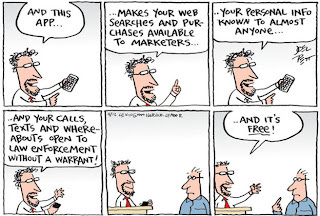The Obama administration wants access to our cell phone records without obtaining a warrant first.

The U.S. Congress should pass a law to give investigators freer access to certain cellphone records, an Obama administration official said on Thursday, in remarks that raised concern among advocates of civil liberties and privacy.
Jason Weinstein, a deputy assistant attorney general in the Justice Department's criminal division, argued that requirements for warrants at early stages of investigations would "cripple" prosecutors and law enforcement.
The U.S. Supreme Court ruled this year that a warrant was needed to put a GPS satellite tracking device on a suspect's vehicle, prompting questions about other instances where probable-cause warrants should be needed to obtain information in the rapidly changing world of mobile devices.
Federal courts around the country are split on whether to require warrants for records of phone usage collected at towers that transmit cellphone signals, Weinstein told a conference.
While prosecutors have been told to get warrants to put a tracking device on a vehicle or to track the precise GPS location of a person via their cellphone, they should not be needed to obtain data from the towers, Weinstein said.
"There really is no fairness and no justice when the law applies differently to different people depending on which courthouse you're sitting in," he said at the "State of the Mobile Net" conference sponsored by the Congressional Internet Caucus Advisory Committee.
The Electronic Frontier Foundation responded:
The problem with the DOJ's position is that it fails to take into account privacy. The only way to ensure "fairness" and "justice," is to demand that our Fourth Amendment rights not be violated by law enforcement working closely with cell phone providers to access your location information without your knowledge. We've already seen that despite the ruling in Jones, law enforcement and the wireless industry are finding ways to continue their pre-Jones practices of warrantless surveillance amid a stunning lack of transparency. We're slowly seeing legislative action in the right direction on these important issues. On the federal level, Senator Ron Wyden (D-Or) has proposed the GPS Act, that would require law enforcement to obtain a search warrant to access location information. In California, we sponsored a bill with the ACLU of Northern California, to require law enforcement to get a search warrant anytime it wants location information about another person in California. And earlier this week, Representative Ed Markey (D-Mass) sent a request (PDF) to the biggest wireless carriers, demanding information about their relationship with law enforcement.
Requiring the police to obtain a search warrant -- the traditional method for balancing law enforcement needs with individual privacy -- and demanding the wireless industry be transparent about how they deal with law enforcement requests for location information are critical steps in the right direction, towards "fairness" and "justice," location privacy and transparency.
http://www.reuters.com/article/2012/05/03/us-usa-security-surveillance-idUSBRE84215620120503
https://www.eff.org/deeplinks/2012/05/easier-gov-access-cell-phone-records-cripples-privacy?utm_source=twitterfeed&utm_medium=twitter


